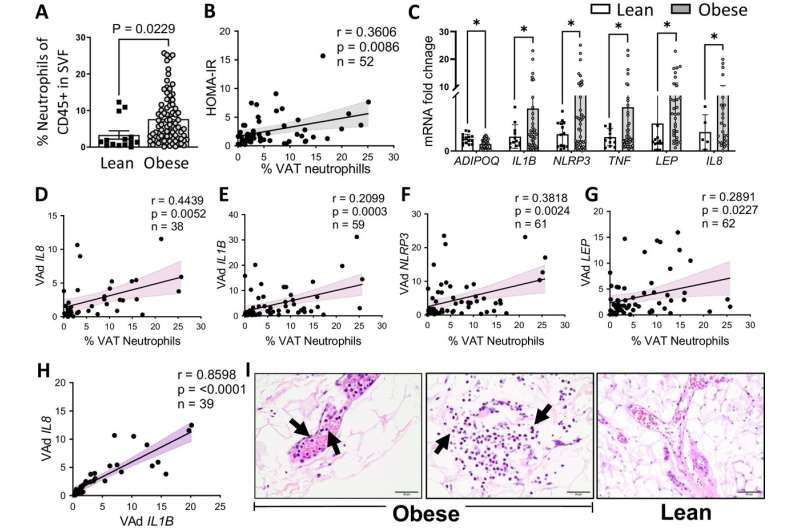This article has been reviewed according to Science X's editorial process and policies. Editors have highlighted the following attributes while ensuring the content's credibility:
fact-checked
peer-reviewed publication
trusted source
proofread
Study finds obese patients have more neutrophils than those who are not obese

Obesity is an epidemic within the United States, with more than 70% of the adult population being overweight or obese.
Obesity increases the risk of numerous complications, including insulin resistance, type 2 diabetes, non-alcoholic steatohepatitis, Alzheimer's disease, cardiovascular disease, stroke, sleep apnea, poor wound healing, cancer, and other comorbidities.
Neutrophils are the most common type of white blood cell in the body. These cells are increasingly implicated in chronic inflammation and metabolic disorders.
"Our study found that belly fat that surrounds organs in the abdomen—also known as visceral adipose tissue (VAT)—from individuals with obesity contains more neutrophils than in those without obesity," said study co-corresponding author Willa A. Hsueh, MD, director of the Diabetes and Metabolism Research Center at The Ohio State University Wexner Medical Center.
"This is the earliest immune response we identified in instigating VAT inflammation in response to a high fat diet. The neutrophils may be responding to changes in the gut microbiome."
The study findings are published online in the journal Nature Communications.
How the study was conducted
The study examined the gut microbiome of mice. A microbiome is a group of microorganisms living together.
Researchers force-fed microbiome-depleted mice with stool from patients with and without obesity who were eating either a high-fat or normal diet.
"Only mice receiving a high-fat diet and stool from people with obesity show enrichment of VAT neutrophils. We believe that the mechanism involves specific microbes, which are enriched in the microbiomes of individuals with obesity, getting out of the gut and into the visceral adipose tissue, leading to neutrophil recruitment and chronic inflammation," said study co-corresponding author Daniel J. Spakowicz, Ph.D., research assistant in Ohio State's Division of Medical Oncology.
He's also a member of the Molecular Carcinogenesis and Chemoprevention Program at The Ohio State University Comprehensive Cancer Center and Arthur G. James and Richard J. Solove Cancer Hospital.
A total of 96 human patients were recruited from Ohio State's Center of Minimally Invasive Surgery. Patients ranged in age from 21 to 75 years old, with body mass indexes (BMI) ranging from healthy to obese (18–50 kg/m2). BMI measures body fat based on height and weight.
Patients were excluded from the study if they were taking a chronic steroid or anti-inflammatory agent, had end-stage renal or liver disease or had a past diagnosis of acquired immune deficiency syndrome (AIDS) or neoplastic disease.
Lean patients were scheduled to undergo elective, non-emergent intra-abdominal surgery, primarily gall bladder removal or hernia repairs.
In contrast, patients with obesity were scheduled to undergo either Roux-en-Y gastric bypass or sleeve gastrectomy bariatric surgery. All patients gave informed consent and underwent medical evaluation before study enrollment.
Blood samples were obtained during pre-operative care and before the administration of anesthesia.
Visceral adipose tissue (VAT) biopsies were obtained at the time of surgery before gut manipulation in both patients with obesity and lean patients.
"These human VAT neutrophils exhibit a distinct gene expression pattern found in different human tissues, including tumors. We believe that these specific neutrophils and bacteria could lead to a novel therapeutic target for treating inflammatory-driven complications of obesity, including insulin resistance and colon cancer," said Hsueh, a professor in the Department of Internal Medicine in the Division of Endocrinology, Diabetes & Metabolism at The Ohio State University College of Medicine.
More information: Dharti Shantaram et al, Obesity-associated microbiomes instigate visceral adipose tissue inflammation by recruitment of distinct neutrophils, Nature Communications (2024). DOI: 10.1038/s41467-024-48935-5




















